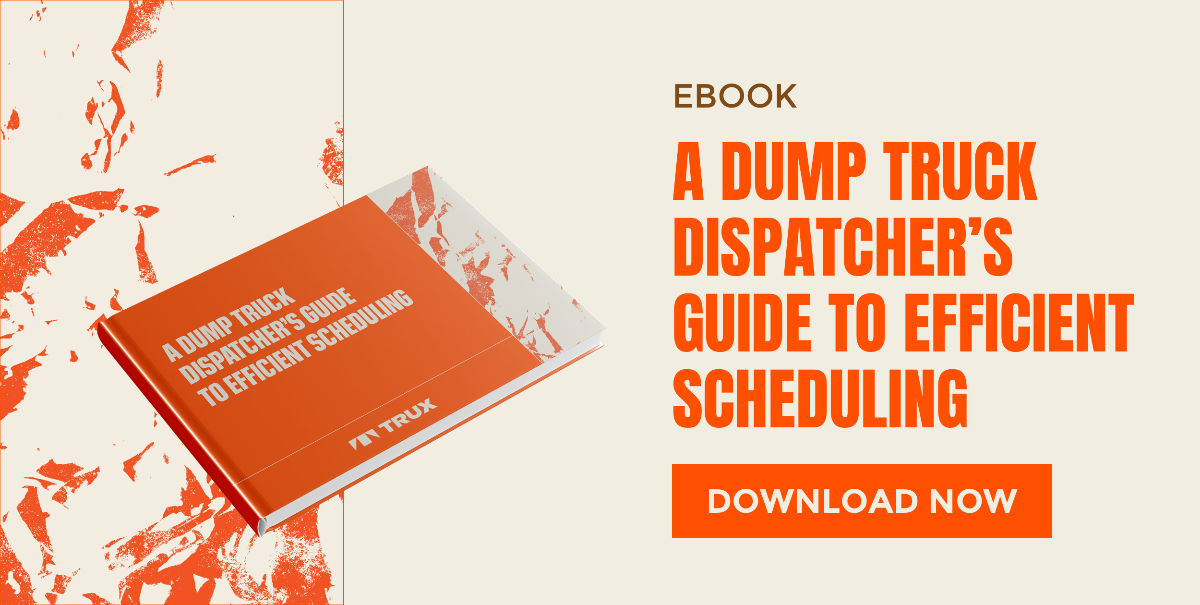7 min read
Enhancing Customer Satisfaction in Construction Logistics: A Trucking Dispatcher's Role
By: TRUX Team on Oct 30, 2023 8:00:00 AM

In today's fast-paced construction logistics industry, dump truck dispatchers play a critical role in ensuring smooth operations and customer satisfaction. This article delves into the importance of efficient dispatching and provides valuable strategies for delivering timely service. By utilizing advanced software tools like GPS tracking and communication systems, dispatchers can enhance efficiency and proactively address any issues that may arise. The article also emphasizes the significance of open communication and the benefits of data analytics in achieving success in the industry.
Click a topic below to jump to the relevant section:
Introduction- Brief overview of the construction logistics industry
Understanding the Role of a Trucking Dispatcher
The Link Between Dispatching and Customer Satisfaction
Effective Strategies for Timely Service
Open Communication: The Key to Trust
Swift Issue Resolution: Handling Challenges Proactively
Introduction- A bRIEF oVERVIEW OF THE CONSTRUCTION LOGISTICS INDUSTRY
Construction logistics play a vital role in every project, acting as the foundation for its success. From planning and managing to delivering material, equipment, and personnel, logistics ensure that all the necessary resources are readily available at the right place and time, enabling projects to run smoothly and efficiently. To achieve this, dispatchers rely on tools such as dump truck management software, which provides constant monitoring of trucks and material, aiding in the planning process for their projects. Successful logistics not only impact job productivity but also serve as a valuable tool for enhancing customer satisfaction. Logistics tools like Trux assist you in meeting project deadlines, managing customer costs, communicating efficiently, and minimizing on-the-job disruptions caused by breakdowns or other unforeseen issues.
Understanding the Role of a Trucking Dispatcher
Dump truck dispatchers play a crucial role in industries where the smooth movement of materials is vital for project success. Dispatchers handle a range of daily responsibilities, some of which include efficient planning, scheduling, and coordination of loads while also maintaining strong communication channels with both truck operators and customers. Additionally, dispatchers take charge of record-keeping, enabling companies to analyze performance and identify potential areas for cost savings and optimization.
The Link Between Dispatching and Customer Satisfaction
We've already talked about the different responsibilities of dump truck dispatchers, but it's important to recognize the significant impact they have on the company and overall customer satisfaction. Let's dive into the effects of efficient dispatching:
Timely Service: Efficient dispatchers ensure that their trucks arrive on schedule with the correct amount of material. The ability to dispatch trucks in a way that optimizes load times and capacity helps customers meet their project deadlines, increasing their overall satisfaction.
Cost Savings: Efficient dispatching not only improves operational costs but also leads to significant cost savings. By optimizing truck schedules to minimize fuel consumption and operational expenses, you can pass on these savings to your customers. This not only enhances their job efficiency but also increases their satisfaction and the overall value they derive from your services.
Resource Allocation: Dispatchers possess the ability to effectively allocate dump truck resources for each job, ensuring the efficient delivery of the appropriate materials according to the customer's schedule and requirements. Tools like Trux provide dispatchers with valuable insights into customer needs, simplifying this decision-making process.
Communication: As the primary point of contact for material delivery, dispatchers play a crucial role in ensuring efficient and accurate communication with customers. This not only enhances customer satisfaction but also encourages continued use of your business.
Flexibility and Adaptability: Let's face it, many (most?) orders come in late or at the last minute. The ability to adapt and respond to unforeseen circumstances is a valuable skill. For customers, having a dispatcher who can promptly meet their needs by arranging for extra materials or dispatching an additional truck can result in immense satisfaction and the establishment of a robust, enduring relationship.
Effective Strategies for Timely Service
When looking to achieve timely service, it is helpful to take advantage of any tools at our disposal. One of the most useful tools to make use of is software. Here are some examples of how software can affect your office.
Real-Time Tracking: Software solutions like Trux Deliver give you access to integrated GPS systems that give you access to live truck locations. Seeing your trucks in real time allows you to keep track of deliveries, identify delays, and make adjustments as needed. Trux also lets you share this information with your customers!
Task Scheduling: Software provides more visibility into all the tasks for that day. This enables you to schedule tasks more effectively amongst your fleet. This visibility also helps with prioritization, helping you make schedules that work for you and your customers.
Communication and Collaboration: Software with integrated communication tools helps you stay connected with your fleet throughout the day. This makes it easier to communicate changes in deliveries or schedules, helping you keep your schedule on time and easily adapt throughout the day.
Data Analytics: Software makes it easy to collect data about your daily performance, allowing you to adjust timetables and make more informed scheduling decisions based on historical data. This practice can result in time and money savings.
Paperless Documentation: By introducing software that works with your dispatchers and haulers, you eliminate the need for paper load slips and have details from every load instantly and easily accessible at a moment's notice. Having this digital access reduces administrative overhead and provides your finance team with the data they need to increase cash flow and reduce invoicing costs.
Integration with Other Systems: It is not enough to have a software solution; you need software that integrates with your other systems. By having a dispatching tool that can integrate with your scale house and financial systems, you connect your company and make it easier to operate in every department.
Open Communication: The Key to Trust
Effective communication is key to achieve operational excellence and keep your customers satisfied. It not only makes your job easier, but it also simplifies your customers' experience. Trux provides you with communication tools that facilitate seamless communication among your team members and with your customers.
Your customers rely on knowing when their materials will arrive. By utilizing Trux Delivery Tracker, you can give them access to real-time information about their deliveries, including details about the haulers assigned to deliver materials to their site, the truck they are driving, and a direct phone number for contact. This allows customers to be prepared for deliveries and builds trust by demonstrating your commitment to getting their materials to them as soon as possible.
These communication tools also enhance internal communication among your haulers. In the event of any changes, such as an updated delivery location, you can quickly communicate with all the trucks on assignment without the need for multiple phone calls or the risk of miscommunication. This efficient and clear communication not only fosters trust among your haulers but also instills confidence in your customers, knowing that your team can adapt swiftly to any situation.
Swift Issue Resolution: Handling Challenges Proactively
Dispatchers in the logistics industry often face challenges that require quick reactions to address problems. What if there was a way to be more proactive and better prepared for these issues? We've already discussed how software tools like GPS tracking, communication tools, and scheduling software like Trux can help achieve timely deliveries and customer satisfaction. But these capabilities also enable dispatchers to have greater visibility into their operations, allowing them to proactively adjust scheduling practices, identify available haulers for additional trucks when needed, and communicate any changes that could potentially cause delays to their team.
By utilizing these tools, dispatchers are better equipped to respond to issues and promptly communicate any necessary changes to customers. Moreover, the data collected through these solutions not only helps dispatchers prepare for daily challenges but also enables them to plan more effectively for the future by identifying patterns or trends that may repeat. By analyzing the requirements and preferences of specific repeat customers based on historical data, dispatchers can anticipate their needs more accurately.
Learn more about how dispatching software can help with the critical and complex task of dump truck scheduling in this eBook.
Frequently asked questions
Q: What is the primary role of a trucking dispatcher in construction logistics?
A: A trucking dispatcher manages the scheduling and routing of deliveries in the construction industry. They play a pivotal role in ensuring timely deliveries, which directly impacts project timelines and overall customer satisfaction.
Q: Why is open communication considered key to building trust in construction logistics?
A: Open communication ensures all stakeholders are informed about delivery statuses, potential delays, or changes. By maintaining transparency, dispatchers can build trust with both drivers and clients, leading to smoother operations and heightened customer satisfaction.
Q: How can dispatchers proactively handle challenges in the construction industry?
A: Dispatchers can handle challenges by identifying common issues and finding solutions in advance. Regular feedback sessions and continuous training equip them with the skills and knowledge to address problems swiftly, minimizing disruptions and ensuring customer satisfaction.
Related Posts
Trucking Dispatcher Business Tips: Become a Successful Dispatcher
Are you wondering how to be a good dispatcher? The job of trucking dispatchers is integral to...
Dispatch Trucking Software Elevates Role of Dump Truck Dispatcher
With dispatch trucking software at their disposal, dispatchers at materials companies and large...
Top 8 Reasons Dump Truck Dispatchers are Burning Out
You’ve no doubt already felt the impact of the skilled labor shortage this season. All across the...

